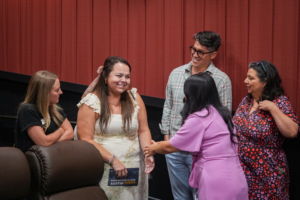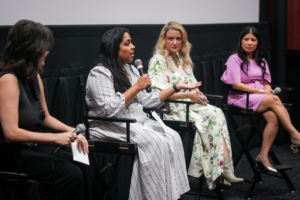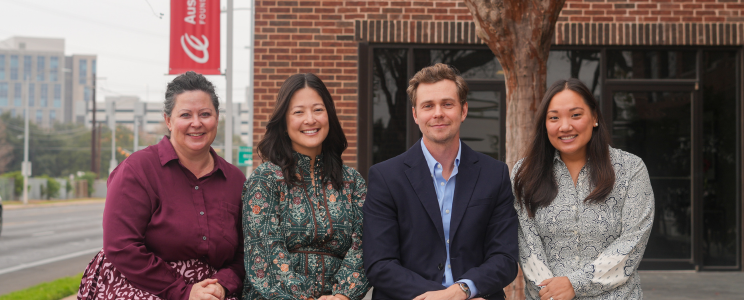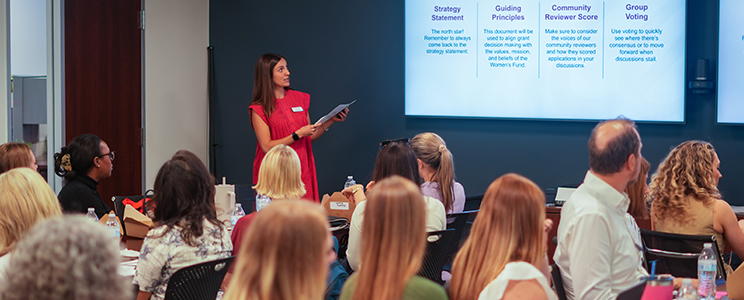 Last month, Austin Community Foundation’s signature programs, the Women’s Fund and Hispanic Impact Fund, co-hosted a screening of No Small Matter, a documentary that explores how the first five years of a child’s life are a period of extraordinary brain development—shaping how they learn, relate, and succeed later in life.
Last month, Austin Community Foundation’s signature programs, the Women’s Fund and Hispanic Impact Fund, co-hosted a screening of No Small Matter, a documentary that explores how the first five years of a child’s life are a period of extraordinary brain development—shaping how they learn, relate, and succeed later in life.
No Small Matter makes the compelling case that investing in young children is one of the most effective ways to build a stronger, more equitable society. The film screening and panel discussion brought together community leaders, parents, investors, and advocates to reflect on progress made in our community to support young children and their families, and the work still to be done.
Why Early Childhood Matters
Did you know that about 90% of a child’s brain is developed by the age of five? This means that most brain growth happens before children even start kindergarten—demonstrating that even early child care should be considered a key developmental opportunity. During the first few years of life, more than 1 million new neural connections form every second, shaping the architecture of the brain based on a child’s early experiences, relationships, and environment.
Children who have access to nurturing, stimulating, and safe early learning environments are more likely to read proficiently by third grade, graduate from high school, and earn higher wages as adults. Conversely, when families lack access to affordable, high-quality child care, the effects ripple outward: parents—especially mothers—are pushed out of the workforce, educators face low pay and burnout, and children miss the developmental supports they deserve.
Our Community’s Commitment to Children and Families
The Women’s Fund and Hispanic Impact Fund are collective giving networks focused on advancing economic mobility for women and Latinos in Central Texas—and investing in early childhood care and education is a key strategy for both. For the Women’s Fund, this means increasing access to safe, quality, culturally competent, and affordable child care that is conveniently located for families with low incomes. For the Hispanic Impact Fund, this looks like investing in organizations that provide access to affordable, high-quality pre-K and early childhood education starting at age 3.
As a Women’s Fund Steering Committee member, I know our research shows that child care in Central Texas costs about 20-25% of a family’s income. And not only is child care expensive, but it is also hard to find. Across Central Texas, there are child care deserts where the available seats do not meet the demand for the zip code.
Fortunately, our community has the power to strengthen the child care ecosystem. Last year, Travis County voters approved a tax increase that generates approximately $75 million annually to increase access to affordable and high-quality child care and afterschool/summer programming for low-income families. This initiative, called “Raising Travis County,” will dramatically change lives, with the potential to support 10,000 children annually with affordable, quality child care when and where they need it. Additionally, it will allow more parents and caregivers to enter the labor force, increase hours at work, and complete workforce development programs, increasing skills and wages that lead to a more stable and supportive home environment.
Insights from the Local Leaders
Following the screening, a panel of early care and education experts and parents discussed how increasing access to high-quality early care and education is playing out in Central Texas.

Panel of experts speaking at the screening
The panelists included Jigna Patel, Outreach, Culture and Engagement Specialist at the Teacher Retirement System of Texas; Leah Meunier, Strategic Advisor, Raising Travis County, Travis County Health and Human Services; and Maggie Jaime, Executive Director at AVANCE – Austin. The moderator, Barbara Grant Boneta, Director of the Austin/Travis County Success by 6 Coalition at the United Way for Greater Austin, led the group in a discussion about the importance of supporting the needs of young children and their caregivers.
Panelists spoke passionately about how high-quality early care and education isn’t just powerful, it is possible. They emphasized exciting opportunities like Raising Travis County to dismantle systemic barriers, meet families where they are, and increase access to high-quality early care, education, and after-school programming.
What We Can Do Together
Change is possible, but it requires all of us. Here are a few ways the community can make a difference:
- Advocate for increased public investment in early childhood education and child care subsidies at the local and state levels.
- Support local organizations working on early childhood issues through volunteering, donations, or partnerships.
- Share your story. Whether you’re a parent, teacher, or business leader, your voice helps raise awareness about why early childhood care and education are essential for a strong and equitable community.
For those interested in viewing the documentary, No Small Matter is available on Amazon Prime. Austin Community Foundation hosts regular events, like this screening, to spotlight critical issues impacting our region. Want to stay informed on upcoming events? Get involved with the Women’s Fund or Hispanic Impact Fund, or subscribe to ACF’s monthly newsletter for the latest news and learning opportunities.
Brooke Freeland is a Women’s Fund Steering Committee member and former chair. She is the Managing Director for the Couch Family Foundation and serves as their Early Care and Education Advocacy and Public Policy Consultant.


